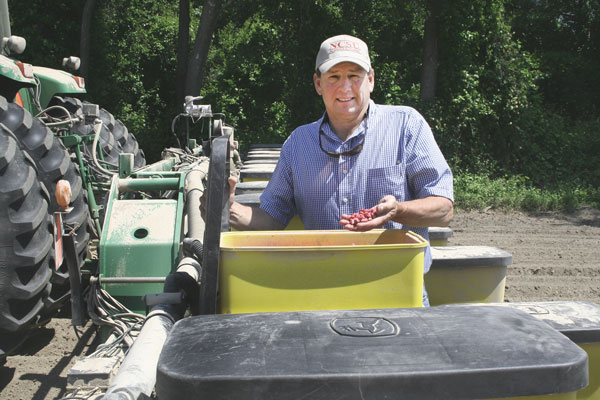
Jart Hudson: Peanut Profitability Award winner for Upper Southeast
• Jart Hudson now grows more than 1,000 acres of peanuts, is co-owner of a peanut buying point at nearby Warsaw, N.C., and his farming operation includes large acreages of tobacco, corn, and wheat, plus a hog finishing operation.
July 8, 2013

Jart Hudson, a fourth generation peanut farmer at Turkey, N.C., says peanuts are as much a social and cultural part of his heritage as the crop is to the economic well-being of his large, diversified farming operation.
He now grows more than 1,000 acres of peanuts, is co-owner of a peanut buying point at nearby Warsaw, N.C., and his farming operation includes large acreages of tobacco, corn, and wheat, plus a hog finishing operation.
Because of his efficiency as a peanut grower, Hudson has been named the Farm Press Peanut Profitability Award winner for the Upper Southeast Region.
But in the early days of his farming career, such an operation was far from reality, he says.
“As a boy, one of my jobs on the farm was to ride on the back of a two-row applicator, stick in hand, charged with keeping the landplaster applicator from stopping up as it was applied to peanuts. At the end of the day, I looked like Casper the Friendly Ghost,” he laughs.
Back then, peanuts were unique to his part of North Carolina. The government allotment program was in place and getting acreage was tough.
“My uncle and my father grew peanuts together, but we’re talking only 15-20 acres back then,” Hudson recalls. “On Sunday afternoons, when I was just a kid, he would take us to a peanut field and my cousins and I would pull up peanut plants and fill the bed of a pickup truck. We’d then go back to my grandmother’s house to pick off the peanuts and boil them.
“The grownups would sit on my grandmother’s front porch, eat boiled peanuts and argue politics. I learned a lot about politicians of the time, a lot about life, and a lot about family from those Sunday afternoons.”
That early social and cultural event led to a modern day celebration on the Hudson farm. The third Saturday of August each year, they boil 55 gallons of peanuts and make 20 gallons of homemade ice cream.
“We do a lot of the same things we used to do at my grandmother’s house,” he says. “The politics are different, and we have 300 to 350 people at the party, but peanuts are still at the epicenter of our social and cultural life.”
1980s were tough on the farm
Growing up on the farm, Hudson almost lived in his father’s shadow, following him to tobacco sales and being with him through all the planting, tending and harvesting of crops. He left to attend North Carolina State University, where he earned a degree in business management and agricultural economics, then returned in 1983 to join the family farming operation. At that time, they farmed about 10-15 acres of peanuts, another 10-15 acres of tobacco, 25 acres or so of vegetable crops and a couple hundred acres of corn.
In the early 1980s, times were “really tough” for farmers in Samson County, he says. The largest farmer in the area had less than 500 acres. “Just to stay in business from one bad year to another was a real challenge. With a lot of hard work, good employees, and a first class business partner, we’ve been able to increase the size of our farming operation and peanuts have been a big part of that growth,” Hudson says.
After the peanut allotment program went away in the early 2000s, the door opened for him to increase acreage. “We had been growing peanuts on our farm for as long as I could remember, but on a very small acreage, and it wasn’t a major crop for us economically. Tobacco had always been our money crop. But when the tobacco buyout came, it offered us more incentives to move into more peanut production.”
One thing that held back peanut production, he says, was that they had no drying facilities on the farm and had to truck their crop 45 miles one way to the nearest buying point. “Just about everything bad that could happen transporting a crop — from flat tires on up — happened to us during that time period,” Hudson says.
In the late 1990s cotton looked like a good option, and getting into the cotton business would later turn out to be the catalyst he needed to increase peanut acreage.
He explains: “I was a partner in a cotton gin, where I met my friend and now long-time business partner, Vic Swinson. Together, we figured out a better way to dry and transport our peanuts. Since then our peanut business has really taken off. Having a good friend to bounce ideas back and forth with is one of the best assets in life.
“After looking at some commercial drying trailers, we decided we could buy used trailers and redesign them ourselves.” After reading an article about drying peanuts in remodeled semi-trailers, he and Swinson bought 30 well-used semi-trailers at Memphis, Tenn. “We ended up spending more on transportation expenses to get them back to our farms than we paid for the trailers,” he says.
For several weekends, employees from Hudson’s farm made the long trip to Memphis to haul the trailers back for refitting to dry peanuts. “That solved some of our problems, but we still had to load peanuts on semi-trucks and send them 45 miles to the nearest buyer,” he says.
Distance to buyer a major obstacle
The major obstacle, they finally came to understand, was the distance to a buyer. They needed a closer buying point.
In partnership with Swinson, Hudson built Four County Peanut Services at Warsaw, N.C. It is a buying point for Golden Peanut Company, offering farmer friendly buying, grading and storage for up to 10,000 tons of peanuts.
Once the challenge of getting peanuts from the field to a buying point and getting paid for their crops was complete, Hudson says he could then concentrate on how to grow peanuts better. In his recently completed office facility, there is a shelf full of county peanut yield championships going back to 1969, when his father was growing the crop.
A key component of growing high yielding, high quality peanuts is the experience of the people who plant and dig the crop, he says. “I’m fortunate to have an excellent work force, some of whom were growing peanuts on our farm before I was born.”
“James ‘June Bug’ Faison and Thomas ‘Buck’ Morrisey have been working here for almost 50 years. Much of what I know about growing peanuts I learned from my father, my uncle Dewey Hudson, and from June Bug and Buck.”
Every step in the peanut production process has to be done right and has to be timely — from fertilizing and planting the crop to protecting it through the growing season. But, Hudson says, “The single most important day in a peanut crop is the day you choose to dig it.
“You can make or lose more yield and have the best or worst impact on quality, depending on whether you get the digging date right or whether you get it wrong. Just a few days too early or too late, and you won’t get optimum production from your crop.
“June Bug says the key to digging peanuts is to not get ‘gas happy’ and go too fast when digging the crop. With some of our older digging machines, we still try to stay around 2.0-2.5 miles per hour. On our bigger, more modern diggers, we can go a good bit faster, but June Bug still likes to take it slow and careful when he’s digging peanuts.”
An additional 6-row digger, equipped with a Trimble GPS guidance system, should speed up the process and make it more precise, Hudson says. The combination of new technology and new and improved varieties will likely make selecting the right time to dig and the actual digging more efficient in the future.
“I read recently that this year’s North Carolina peanut yield champion grew 6,300 pounds per acre. My first thought was, how did he do that? My second thought was, he must have planted a lot of my favorite new variety — Bailey. Selecting the right variety is another critical part of peanut production, and Bailey is one of the best I’ve seen in my lifetime of growing peanuts.”
Peanuts have always been a part of his life, Hudson says, “and we’ve been fortunate to extend some of those cultural and social aspects of the crop to my family.
“Our operation is held together by my best friend and wife, Cece. Without her support, dedication, work, and love, the operation would be nowhere close to what it is today. Not only is she a big asset to the farm operation, she’s a great mother to our children — sons Pelmon,14, Paxton,13, and daughter, Phagan,12.”
More from Southeast Farm Press
Transferring farm management responsibilities to the 'next generation'
Kudzu bugs transforming insect control picture of soybeans
Time to plan for cool-season forage
About the Author(s)
You May Also Like





